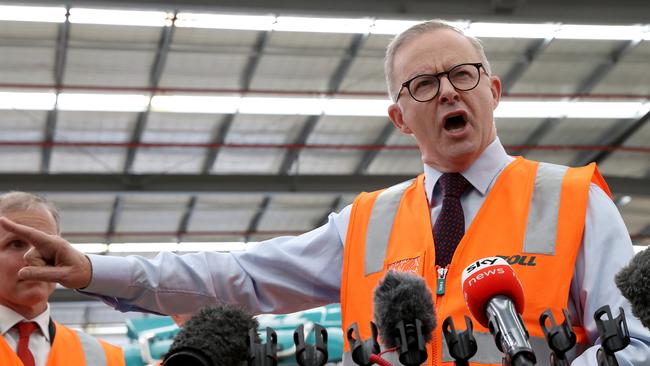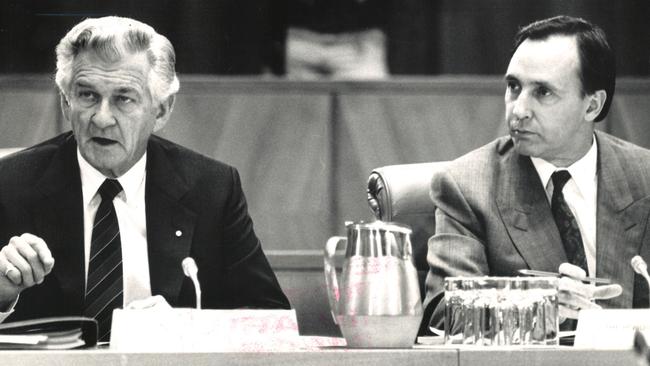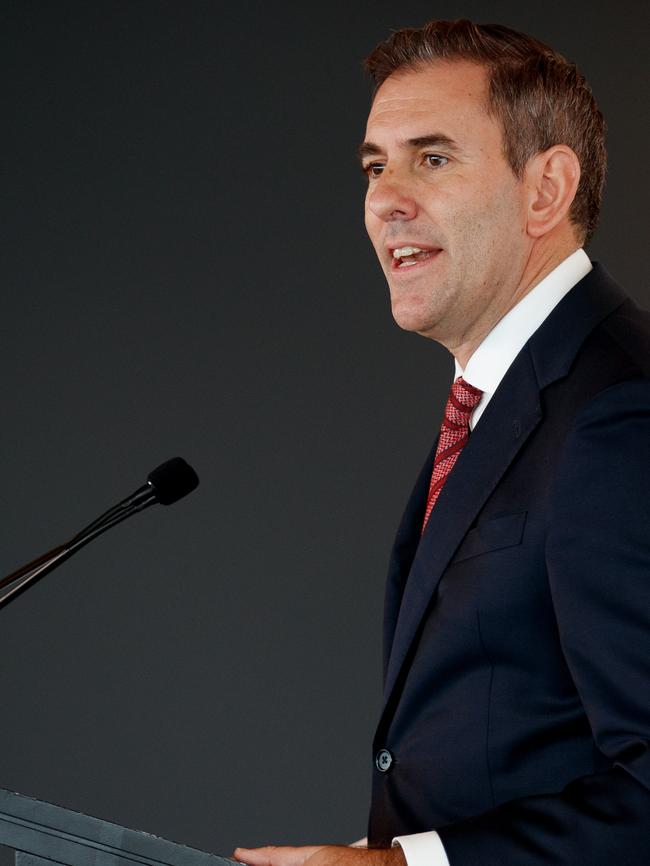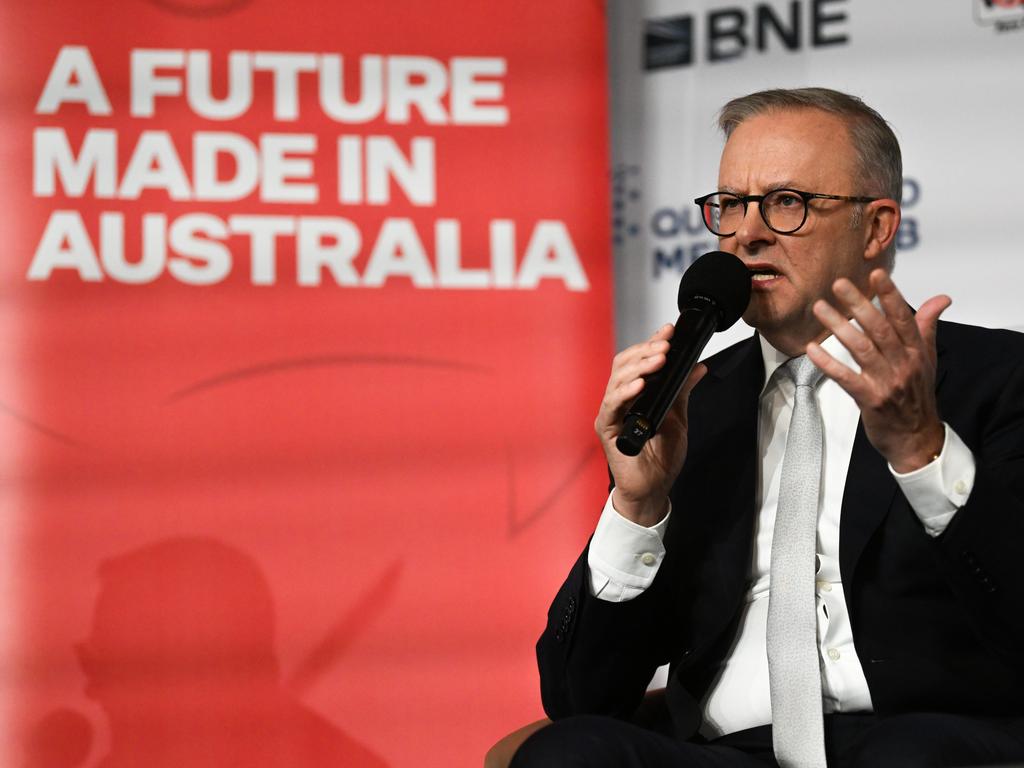
On display was Albanese in rhetorical overdrive. While Jim Chalmers has spent years in opposition and government devising a new Labor productivity agenda for the 21st century, the Albanese declaration has given this agenda a sharper philosophical spearhead.
The veneer is stripped away. The backlash is fierce. Albanese seems to have let the sunlight shine on Labor’s true economic character. Chalmers has long cultivated a Labor growth agenda for a transformed world. But his narrative spans a wide spectrum driven by his critique of the status quo, namely that Australia’s economy is “not productive enough, not competitive and not dynamic enough”.
The Treasurer talks up economic reform, enhanced productivity and higher growth. He pledges “a new Labor Party growth model”. Sounds great – but this isn’t the Albanese government. The central policy co-ordination is missing. Too many ministers are doing the exact opposite. This government is a work in progress but Albanese has now given an epic framing to its purpose.
The Prime Minister begins with a truism – global economic policy is being transformed. He sees the 2020s decade as marking a “fundamental shift”, a break from “old orthodoxies”, and this shift is as significant “as the industrial revolution” – its operating principle is greater government intervention, with government becoming “a participant, a partner, an investor and enabler”.
Albanese says government will use its size and strength to assume some of the economic “risk”. The goal is a future “made in Australia” – that means investing in new industries, deploying industry “incentives”, using the superannuation funds and “investing in manufacturing to make more things here”. He offers as an example $1bn in government support for the Solar Sunshot manufacturing program to produce solar panels in the coal-rich Hunter Valley, an industry where China is globally supreme and prices are falling, suggesting razor-sharp competition.
The Biden administration is his policy authoriser. Albanese has surely read the pivotal speech of US National Security Adviser Jake Sullivan at Brookings saying that tax cuts, deregulation and trade liberalisation had undermined America’s industrial base, “hollowed out” industry that had moved abroad (think China) and diminished the middle-class heart of America. Joe Biden, he said, would champion the rebuilding of American industrial strength and its strategic capability.
At the same time Biden sponsored the Inflation Reduction Act, driven by three big ideas – delivering on net zero, winning the competition with China and using public investment to redirect American priorities. The IRA authorised massive tax breaks, subsidies and a new industry policy on a scale likened to the New Deal of Franklin Roosevelt.

The new protectionism is justified by the fusion of “economic security and national security” invoking China to transform domestic economic policy.
America seeks to remake the world, yet again. But this policy revolution is harmonised with Labor’s philosophical soul. Albanese is channelling Biden. Sure, he says Australia cannot go “dollar for dollar” with the US but, would you believe, his parallel “made in Australia” policy will make Australia competitive in this new world. Somehow, someway.
This heralds a new step in Australian politics – uniting Labor’s faith in state power with the imperative for radical, unorthodox climate change action. It lays the foundation for a progressive alliance constituting Labor, the trade unions, the green lobby, climate-aware professionals, opponents of the market economy along with the wider progressive movement. It fuses in ideological unity government subsidies, tax breaks and guarantees to secure the massive investment in renewables not otherwise obtainable.
This looms as a departure point – and a dangerous shift for Australia – relying on the erupting paradigm of protection, national security, net zero and state power.

Yet it is contested. The old pro-market truth tellers, the once dominant economic reform lobby, while diminished, are not dead. Indeed, the empire has struck back. On cue, former heads of the Productivity Commission went public, keen to support the Labor-appointed current head, Danielle Wood, who enunciated the truism that “these subsidies will take jobs and capital investments from elsewhere in the economy where they could generate higher value”.
Labor seemed stunned that its own appointee had the audacity to talk such logic. Boosting manufacturing is one the oldest follies in public policy. As independent economist Saul Eslake said, manufacturing was a “low productivity form of economic activity” in Australia. Where is the logic in backing industries with no comparative advantage?
The most devastating critique came from inaugural Productivity Commission chairman Gary Banks, who targeted not just Labor’s “made in Australia” policy but the productivity failures inherent in its energy, industrial relations, taxation, regulatory, National Disability Insurance Scheme, spending and industry policies. This was a warning that Australia was not just making a mistake. It had taken the fundamentally wrong track, that it was promoting anti-productivity agendas, and while Adam Smith famously said “there is much ruin in a nation” Banks said he was unsure “how much more reform our country can stand”.

In his address last week titled Can Australia Meet the Productivity Challenge?, Banks said a “U-turn or at least a detour is called for”. For Banks and others, the gobsmacking aspect is the collapse of historical memory. Australia had this titanic struggle more than 40 years ago when it ditched state winning picking, protection and selected industry boosting for a free trade, pro-market, competitive future.
Banks has infuriated Albanese with his sustained argument that Labor is on a trajectory of economic regression. This government prides itself as riding the wave of the future – now it is branded as being intoxicated by the past, indeed that it is repeating the blunders of the past. For Labor, it is the ultimate insult, hence Albanese attacked Banks as a flat-earther.
Of course the world has changed. But letting politicians, bureaucrats and lobbyists decide investment and industry decisions is a doomed project. Sure, Biden can afford to make mistakes with the vast US economy but Australia cannot afford the same mistakes. Albanese’s speech is so damaging because it offers the apparent clinching argument that this government has decisively turned away from the pro-market reformism of Hawke, Keating and Howard that delivered a golden age of economic growth and living standards. For too long Labor has sent mixed messages about its true fidelity; those messages now seem far clearer.
Banks warned Labor risked “government sponsoring businesses that will never be internationally competitive, creating a long-term dependency on public support at significant net cost to the wider economy”. The risk was greater by targeting areas where the US and China had an established advantage or were seeking one. He ridiculed the Prime Minister and Treasurer saying this was the new competition, not the “old protectionism”, saying the only connection with competition was “government actions that inhabit or distort it”. On energy he said policy was the “antithesis” of real productivity.
Banks said: “They have adopted targets for emissions and renewables without any clear idea of how to achieve them. And in doing so, they have assisted technologies that cannot deliver reliable power while suppressing those that can. The result of all this is an increasingly dysfunctional energy system requiring far more capital to produce far less reliable power.”
He warned Labor seemed to have a “devotion to big government and an antipathy to market forces”. He lamented that both the policy process and outcomes were inadequate.
Albanese and Chalmers need to beware – they have opened the door to a powerful and emerging insight that their government is putting Australia on the wrong path.








The intellectual and political schism over the long-run growth policies of the Albanese government just assumed a far sharper edge given the “future made in Australia” manifesto from Anthony Albanese, surely his most important economic address as Prime Minister.